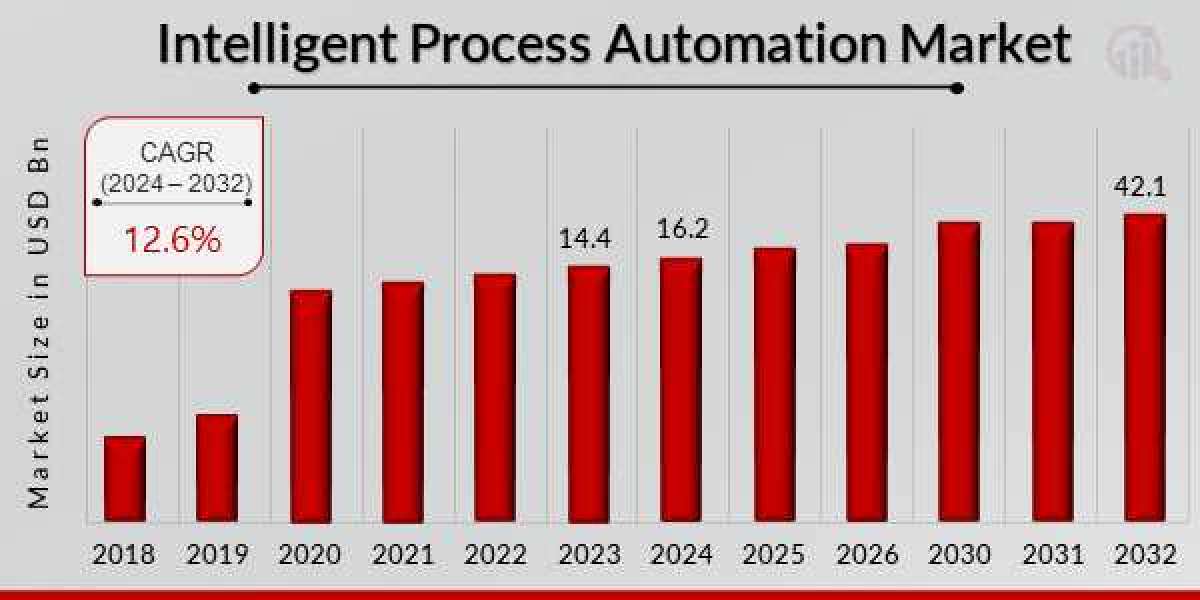Intelligent Process Automation Market Overview
Intelligent Process Automation (IPA) represents a transformative trend in business operations, integrating advanced technologies like artificial intelligence (AI), machine learning (ML), and robotic process automation (RPA) to streamline workflows and enhance efficiency. As organizations increasingly seek to optimize their processes and drive innovation, the IPA market is witnessing rapid growth. This article provides a comprehensive analysis of the IPA market, including its key segments, industry updates, leading companies, market drivers, and regional insights. The Intelligent Process, Automation market industry is projected to grow from USD 16.2 Billion in 2024 to USD 42.1 billion by 2032
Market Overview
Intelligent Process Automation combines RPA with AI and other digital technologies to create smarter, more adaptive business processes. Unlike traditional automation, IPA solutions can handle unstructured data, learn from interactions, and make decisions autonomously. This growth is driven by the increasing need for operational efficiency, cost reduction, and improved customer experiences.
Request To Free Sample of This Strategic Report - https://www.marketresearchfuture.com/sample_request/6065
Benefits of Intelligent Process Automation
- Increased Efficiency: IPA automates repetitive tasks, freeing up human workers for more strategic activities.
- Cost Reduction: By automating routine processes, organizations can significantly reduce operational costs.
- Improved Accuracy: IPA minimizes human error, ensuring more reliable and accurate outcomes.
- Scalability: IPA solutions can easily scale to handle growing volumes of work without a proportional increase in costs.
- Enhanced Customer Experience: With faster and more accurate processing, businesses can offer better services to their customers.
Key Market Segments
The IPA market can be segmented based on component, deployment type, application, organization size, and industry vertical.
By Component
- Software: Includes RPA, AI, ML, natural language processing (NLP), and other intelligent automation software.
- Services: Consulting, implementation, training, and support services that help organizations deploy and manage IPA solutions.
By Deployment Type
- On-Premises: IPA solutions hosted within an organization’s own infrastructure.
- Cloud-Based: IPA solutions delivered through cloud platforms, offering flexibility and scalability.
By Application
- Automated Data Entry: Replaces manual data entry tasks with automated processes.
- Customer Support: Uses AI and chatbots to handle customer queries and provide support.
- Invoice Processing: Automates the capture, validation, and processing of invoices.
- Human Resources: Streamlines HR processes such as recruitment, onboarding, and employee management.
- Supply Chain Management: Enhances the efficiency and accuracy of supply chain operations.
By Organization Size
- Small and Medium Enterprises (SMEs): Increasingly adopting IPA to enhance operational efficiency.
- Large Enterprises: Extensive use of IPA for complex, large-scale process automation.
By Industry Vertical
- Banking, Financial Services, and Insurance (BFSI): High demand for fraud detection, customer service automation, and compliance management.
- Healthcare: Uses IPA for patient data management, billing, and administrative tasks.
- Retail: Enhances customer service, inventory management, and supply chain operations.
- IT and Telecom: Automates network management, customer support, and billing processes.
- Manufacturing: Streamlines production processes, supply chain management, and quality control.
Industry Latest News
Technological Advancements
Recent advancements in AI and ML have significantly enhanced the capabilities of IPA solutions. For example, the integration of NLP allows IPA systems to understand and process human language, making them more versatile in handling customer interactions and other tasks involving unstructured data.
Strategic Partnerships and Acquisitions
Key players in the IPA market are actively pursuing strategic partnerships and acquisitions to strengthen their offerings and expand their market presence. For instance, several IPA vendors have partnered with cloud service providers to offer more comprehensive and scalable solutions.
Regulatory Changes
The increasing focus on data privacy and security has led to stricter regulations, impacting the deployment and management of IPA solutions. Organizations are investing in robust security measures to ensure compliance with regulations such as GDPR and CCPA.
Key Companies
The IPA market is highly competitive, with several key players leading the charge in innovation and market expansion.
- UiPath: A leading provider of RPA software, UiPath integrates AI and ML to offer comprehensive IPA solutions.
- Automation Anywhere: Known for its cloud-based RPA platform, Automation Anywhere provides scalable IPA solutions for various industries.
- Blue Prism: Offers robust RPA tools combined with AI capabilities to enhance business process automation.
- Pegasystems: Provides a unified platform for RPA, AI, and business process management (BPM).
- Microsoft: With its Power Automate platform, Microsoft integrates IPA capabilities to enhance productivity and efficiency.
Market Drivers
Several factors are driving the growth of the intelligent process automation market.
Increasing Demand for Operational Efficiency
Organizations are under constant pressure to improve operational efficiency and reduce costs. IPA offers a solution by automating repetitive tasks and enabling faster, more accurate processing.
Rising Adoption of AI and ML
The growing adoption of AI and ML technologies is enhancing the capabilities of IPA solutions, making them more effective in handling complex tasks and unstructured data.
Digital Transformation Initiatives
Businesses across various industries are undergoing digital transformation to stay competitive. IPA plays a crucial role in this process by enabling the automation of core business processes and enhancing overall agility.
Improved Customer Experience
With the increasing emphasis on customer experience, organizations are leveraging IPA to provide faster, more accurate services. IPA solutions can handle customer queries, process transactions, and manage data more efficiently, leading to improved customer satisfaction.
Cost Efficiency
The cost-saving potential of IPA is a significant driver for its adoption. By automating routine tasks, organizations can reduce labor costs and allocate resources to more strategic activities.
Ask for Customization - https://www.marketresearchfuture.com/ask_for_customize/6065
Regional Insights
The adoption and growth of IPA vary across different regions, influenced by factors such as technological readiness, regulatory environment, and industry demand.
North America
North America holds the largest market share, driven by the early adoption of advanced technologies and the presence of major IPA vendors. The region's strong focus on innovation and operational efficiency further fuels market growth.
Europe
Europe is also a significant market for IPA, with increasing adoption in industries such as BFSI, healthcare, and manufacturing. Strict data privacy regulations in the region are prompting organizations to invest in secure and compliant IPA solutions.
Asia-Pacific
The Asia-Pacific region is expected to witness the highest growth rate during the forecast period. Rapid digital transformation, increasing investments in IT infrastructure, and the growing popularity of cloud-based solutions are key factors driving market growth in this region.
Latin America
Latin America is gradually adopting IPA technology, with growing awareness of its benefits and increasing investments in digital transformation initiatives.
Middle East and Africa
The Middle East and Africa region are also showing promising growth, driven by the adoption of advanced technologies in sectors such as finance, healthcare, and telecommunications.








